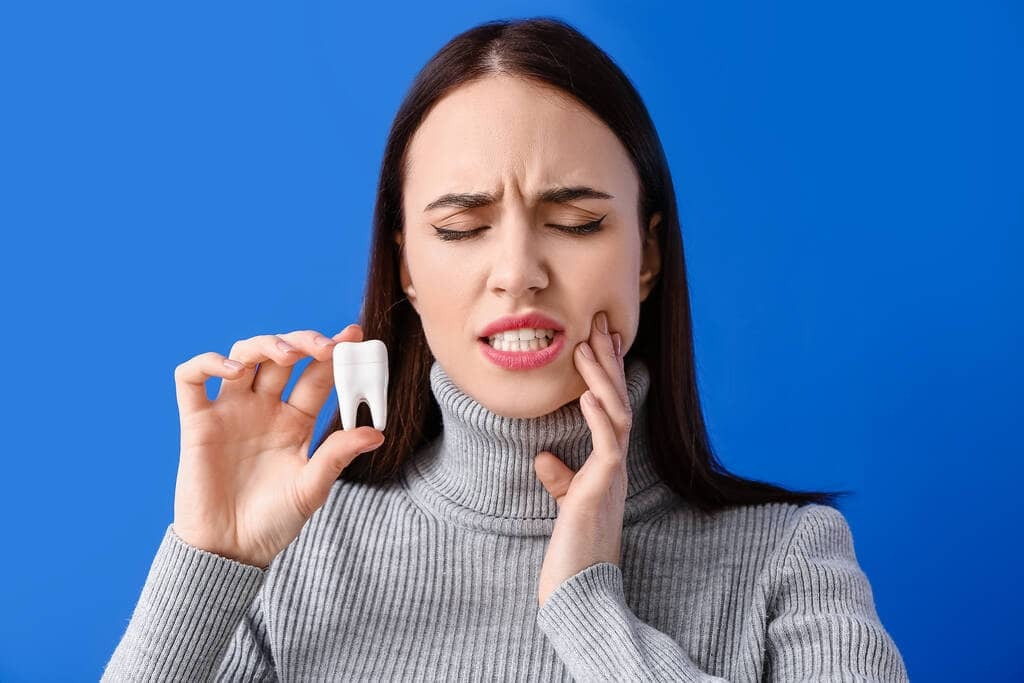Sensitive teeth can be very painful, affecting about 30% of the world’s population. If you are one of the many people who suffer from sensitive teeth, you know that even the simplest things, like drinking a cold beverage or eating something crunchy, can cause pain.
While there is no one-size-fits-all solution to this problem, there are a few things you can do to help manage your sensitive teeth and make your life a little more comfortable.
This article shows you the symptoms and critical causes of sensitive teeth. You will also learn how to take care of your sensitive teeth to prevent painful sensations. Keep reading to learn more.
Table of Contents
 What Are The Symptoms of Sensitive Teeth?
What Are The Symptoms of Sensitive Teeth?
Sensitive teeth can be a common problem and one that can cause a lot of discomfort. If you’re not sure if you have sensitive teeth, here are some common symptoms:
- You experience pain or discomfort when you drink or eat something cold or hot.
- You have a hard time eating or drinking acidic foods and drinks, like citrus fruits or soda.
- You experience a lot of pain when you brush your teeth or get a dental cleaning.
If you’re experiencing any of these symptoms, visiting a Moorooka dentist is essential.
What Are The Causes of Tooth Sensitivity?
Several other things can cause sensitive teeth, including:
- Tooth decay
- Gum disease
- Tooth erosion
- Brushing your teeth too hard
- Using a toothbrush with stiff bristles
- Drinking or eating acidic foods and drinks
- Smoking
- Taking certain medications
Your dentist will be able to determine the cause of your sensitive teeth and recommend the best treatment.
If you’re experiencing tooth sensitivity, don’t hesitate to visit your dentist. Tooth sensitivity can signify a severe problem, so it’s important to get it checked out.
Here’s What You Can Do If You Have Tooth Sensitivity
There are many tips on the internet about caring for sensitive teeth. Sadly, most of these tips are not from certified dentists and have caused more harm than good. If you have sensitive teeth, you’re not alone. Many people have this problem. But what can you do about it? Here are some essential tips to help you:
- See your dentist. The first step is to see your dentist and determine what’s causing your sensitivity. Many things can cause sensitive teeth, such as cavities, gum disease, and worn tooth enamel.
- Get your teeth cleaned regularly. A good dental cleaning can help eliminate the plaque and bacteria that can cause sensitivity.
- Use suitable toothpaste or mouthwash for sensitive teeth. There are many kinds of toothpaste on the market that are designed to help relieve sensitivity. Choose one that contains potassium nitrate or stannous fluoride.
- Use a desensitising toothpaste or mouthwash every day. If your sensitivity is horrible, you may need a desensitising toothpaste or mouthwash every day. Talk to your dentist about which one is right for you.
- Avoid foods and drinks that are high in acid. Foods and beverages that are high in acid can aggravate your sensitive teeth. Avoid citrus fruits, carbonated drinks, and sports drinks.
- Avoid using a toothbrush with bristles that are too hard. A toothbrush with bristles that are too hard can also aggravate your sensitive teeth. Choose a toothbrush with soft bristles instead.
- See your dentist every six months. Regular dental checkups can help catch any problems with your teeth early before they get worse.
How Do Dentists Treat Tooth Sensitivity
Dentists often treat tooth sensitivity with various methods, depending on the underlying cause.
- If a cavity causes tooth sensitivity, the dentist may need to fill the cavity.
- If a cracked tooth causes sensitivity, the dentist may need to repair the crack.
- If a worn-down tooth causes tooth sensitivity, the dentist may need to replace the lost tooth structure with a dental filling or a dental crown.
- If tooth sensitivity is caused by gum infection, the dentist may need to treat the condition with antibiotics or dental cleaning.
- If a dental appliance causes tooth sensitivity, the dentist may need to adjust the device or replace it with a new one.
Back to top: What To Do If You Have Sensitive Teeth?
